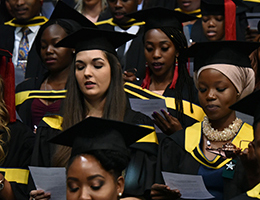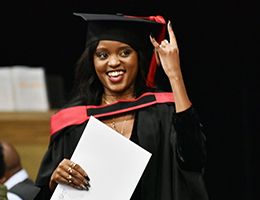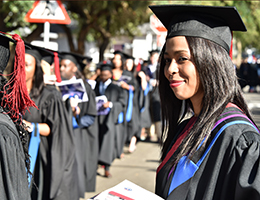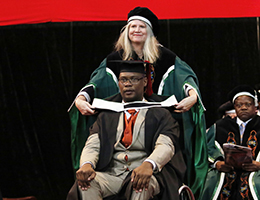PHOTOS: Graduation Ceremonies
Mistakes are powerful; train yourself to embrace and learn from them in order to experience the supreme emancipation that comes with life’s downfalls and victories. This is what the 2018 April graduation ceremonies were all about. This profound thought was instilled by the likes of Dr Anthony Turton, a leader in the field of water as a business risk and opportunity. Dr Turton, an Affiliated Professor in the Centre for Environmental Management at the University of the Free State (UFS), was one of the keynote speakers at this year’s inspirational April graduation ceremonies on the Bloemfontein Campus.
A total of 4 388 qualifications in the form of Certificates and Higher Certificates, Diplomas, as well as Bachelor’s and Honours degrees, were awarded and conferred on the UFS Bloemfontein Campus from 9 to 13 April 2018. These qualifications were awarded to graduates in the Faculties of Health Sciences, Theology, Law, Education, Natural and Agricultural Sciences, Economic and Management Sciences, the Humanities, and the South Campus University Access Programme.
Guest speakers encourage graduates
Addressing Health Sciences graduates, Anita van der Merwe, Professor and Executive Head of the Department of Nursing and Midwifery in the Faculty of Medicine and Health Sciences at Stellenbosch University, said graduates needed to have compassion for other people. “As health practitioners, we should live and work with compassion, which means truly understanding the suffering of others.”
Another strong message emerging from the graduation ceremonies was: “Each person will experience the journey of life differently, but when we let our light shine, we unconsciously allow others to do the same”. This message was shared by Miss Deaf SA for 2017/18, Chantelle Pretorius, in her address to graduates from the Faculty of Education.
“Graduates in the Faculty of Law should regard themselves from now on as having well-trained minds that shall be instruments of liberation and social justice,” said Projects and Campaigns Manager of Corruption Watch, Zola Valashiya.
Deputy President of the Association of Black Accountants in Southern Africa, David Abbey, further encouraged graduates from the Faculty of Economic and Management Sciences to focus their ideas and interests onto their goals until they are reached. He added: “In order for graduates to be successful in any endeavour, they must concentrate their attention intensely on what they want.”
Also addressing graduates from the same faculty, Brand Pretorius, former CEO of McCarthy Limited, motivated them with the following words: “The biggest danger for most of us is that we aim too low, and we achieve it. It is unacceptable to be satisfied with being ‘just okay’.”
Tshegofatso Setilo, Assistant Director of the University Access Programme on the South Campus, motivated graduates to surround themselves with people who are smarter than them, who are humble, who are kind and hard-working.
Addressing graduates from the Faculty of the Humanities, Dr Nthabeleng Rammile, Deputy Chairperson of the UFS Council, said: “I want to challenge our graduates to go out and live their dreams. You owe it to yourselves.”
Graduation Speeches:
Tshego Setilo 9 April Graduation Ceremony
David Abbey 12 April 2018 Graduation Ceremony
The value of listening
Dr Khotso Mokhele, UFS Chancellor, encouraged graduates to be the best that they can be – even if their roles or jobs require them to carry the casualties of someone else, “do it with your chest”, he said. He said graduates needed to master the skill of listening in order to effectively reflect and internalise the lifelong lessons that were delivered to them at the April graduation ceremonies.
Prof Francis Petersen, UFS Rector and Vice-Chancellor, said graduates had the power and responsibility to make a positive change in social society. He further added that graduates were subjected to expectations to go out and make a positive change in the world. He urged graduates to help create an environment that South Africans could all feel proud of.
Talking at the final session of the week-long graduation ceremonies, Hannes van Wyk, Kovsie alumnus and presenter of Kwêla on KykNet, said: “Don’t take everything too seriously, there is a great joy in freedom, and freedom only ever comes from letting go.”
Another highlight
UFS Student Representative Council members, Brady MacPherson, Ntombi Nhlapo, Sonwabile Jongisizwe Dwaba, and Tammy Fray set a great example for fellow students, as they formed part of the elite group – the alumni. They, along with other 2018 graduates, had the honour of being awarded their degrees throughout the week of 9-13 April 2018.
Recorded Livestream of the Graduation Ceremonies:
Monday 9 April 2018

Faculties of Health Sciences and Theology and Religion and South Campus: University Access Programme
WATCH: UFS Autumn Graduation Ceremony 9 April 2018 (morning session)
WATCH: UFS Autumn Graduation Ceremony 9 April 2018 (afternoon session)
“As health practitioners, we should live and work with compassion, which means truly understanding the suffering of others.”
- Prof Anita van der Merwe
“Surround yourself with people who are smarter than you, who are humble, who are kind and hard-working.”
- Tshegofatso Setilo
Tuesday 10 April 2018

Faculty of Law and Faculty of Education
WATCH: UFS Autumn Graduation Ceremony 10 April 2018 (morning session)
WATCH: UFS Autumn Graduation Ceremony 10 April 2018 (afternoon session)
“Law students should regard themselves from now on as having well-trained minds that shall be instruments of liberation and social justice.”
- Zola Valashiya
“Each person will experience the journey of life differently, but when we let our light shine, we unconsciously allow others to do the same.”
- Chantelle Pretorius
Wednesday 11 April 2018

Faculty of Natural and Agricultural Sciences
WATCH: UFS Autumn Graduation Ceremony 11 April 2018 (morning session)
WATCH: UFS Autumn Graduation Ceremony 11 April 2018 (afternoon session)
The power of integrity – let your moral compass be your guide in times of great uncertainty.”
- Anthony Turton
Thursday 12 April 2018

Faculty of Economic and Management Sciences
WATCH:
UFS Autumn Graduation Ceremony 12 April 2018 (morning session)WATCH:
UFS Autumn Graduation Ceremony 12 April 2018 (afternoon session)The biggest danger for most of us is that we aim too low, and we achieve it.”
- Brand Pretorius
“In order to be massively successful in any endeavour, you must concentrate your attention intensely on what you want.”
- David Abbey
Friday 13 April 2018

Faculty of the Humanities
WATCH: UFS Autumn Graduation Ceremony 13 April 2018 (morning session)
WATCH: UFS Autumn Graduation Ceremony 13 April 2018 (afternoon session)
“Today, I want to challenge our graduates to go out and live their dreams. You owe it to yourselves to live your dream.”
- Dr Nthabeleng Rammile
“Don’t take anything too seriously, there is a great joy in freedom, and freedom only ever comes from letting go.”
- Hannes van Wyk